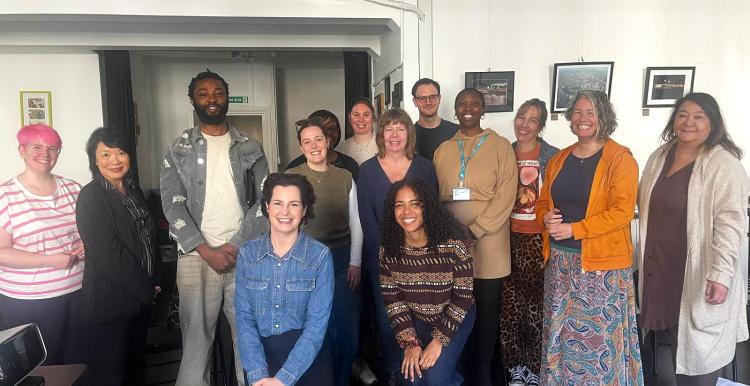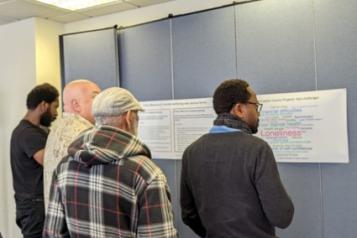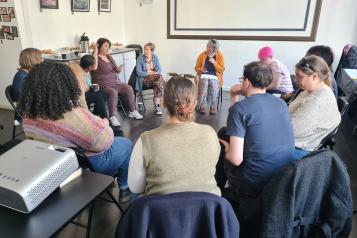The power of community in action: How we’re strengthening local mental wellbeing networks

Grassroots organisations like Mama2Mama, KidsFest, Carers Social and LGBTQ+ Thamesmead are reaching those who need it most. They are trusted, embedded and provide culturally tailored support for their communities. But for their support to be sustained, these groups need systems that actively invest in their growth.
Through our Be Well Support programme, we’ve worked closely with these organisations to better understand their challenges and provide tailored, practical support. From strengthening engagement networks to enhancing digital skills and developing capacity, we’re working with local champions to amplify their impact and drive meaningful change in how mental wellbeing support is designed and delivered across the borough.
As a trusted partner in our communities, we’re sharing these insights to shape a more collaborative and inclusive approach to mental wellbeing in our borough, inviting partners across the system to step forward and help drive this change.
Building sustainable engagement and resilient community networks
One of the most common challenges we hear from grassroots organisations is the difficulty of maintaining long-term engagement, particularly when teams are small, voluntary, and under-resourced. Despite their vital work, they often work in isolation, without the time, space, or support to collaborate and scale their reach.
In response, we’ve created opportunities for connection and collaboration. When one of our Be Well partners suggested a grassroots ‘speed-dating’ event, we listened and took action. The result was a dynamic networking session that brought together grassroots groups, funders, and mentors, sparking new partnerships and offering practical support, from expert advice to signposting and training opportunities.
Recognising that lasting change is built through connection, we’ve supported groups to actively engage in local network meetings, spaces designed for shared learning, mutual support, and collaboration. These regular sessions are more than just meetings; they’re helping to strengthen relationships, build trust, and foster a culture of collective problem-solving that sustains energy and momentum across the sector.
But building strong networks takes more than active collaboration, it requires investment. We’re calling on stakeholders to strengthen this work by supporting peer mentoring pathways and leadership development opportunities, ensuring that these organisations and their volunteers feel supported, valued, and connected.
Embedding inclusion at the center of mental wellbeing support
Mental wellbeing support isn’t a one-size-fits-all approach. Too often, community groups tell us that their members don’t feel seen, heard, or understood by traditional services. That’s where community groups step in.
Organisations like LGBTQ+ Thamesmead and Carers Social are offering support that feels safe, familiar, and free from judgment. But while their work is vital, they’re often doing it alone, with limited resources, limited capacity, and limited access to wider systems of support.
That’s why we’ve worked with them to meet those challenges. With LGBTQ+ Thamesmead, we supported them to access safeguarding training, inclusive sexual health resources, and facilitated connections with key partners like Metro GAVS and the University of Greenwich to broaden their community reach. For Carers Social, we responded to a need for wider engagement, helping them connect with peer groups, build new relationships, and access funding opportunities.
These are practical actions, but they reflect a broader principle: inclusion requires investment. We need system partners to match these efforts by providing resources and training that enable organisations to design their services around the people they support. This includes inclusive practice toolkits, trauma-informed approaches, and more flexible funding models.
Supporting Sustainable Funding Models
Short-term grants are a major barrier for grassroots organisations trying to plan or scale their work. We’ve consistently heard that while these groups are delivering vital mental wellbeing support, many are operating without core funding or any long-term financial security.
We’ve stepped in by offering support to help groups navigate the local funding landscape. We’ve signposted organisations like Mama2Mama and Kids Fest to the Community Grant Finder and local workshops dedicated to guiding writing strong applications and identifying funders aligned with their mission.
But real change means fixing the system so that funding is easier to find, more flexible, and available for everyday running costs, not just specific projects. We’re encouraging stakeholders to streamline funding models and offer more resources like the Community Grant Finder to help groups scale their work.
Boosting Digital Capacity for Wider Reach
In today’s increasingly digital world, a strong online presence is essential for grassroots organisations to stay connected with their communities. From hosting virtual support groups to promoting services online and sharing resources via social media, digital tools are key to broadening their impact. Yet many grassroots organisations lack the time, tools, and technical expertise to develop a meaningful digital presence.
At Healthwatch Greenwich, we’ve taken action to deliver tailored support. This includes social media training, sharing website development tools, and strategic advice to help groups make the most of their digital platforms. And the results are clear: more organisations are now confidently exploring digital platforms to connect with their communities.
To build on this momentum, we’re launching our Social Media Toolkit, a practical resource designed to help grassroots organisations shape a strategy that suits their needs, goals, and capacity.
Stakeholders can play a critical role in this work. By funding digital upskilling, providing access to free or low-cost tools, and supporting broader digital inclusion initiatives, they can help ensure that grassroots organisations access the tools they need to become more confident online.
Looking Ahead: Our Commitment
This week has reinforced the role grassroots organisations play in delivering mental wellbeing support that is local, trusted, and responsive. Yet for these organisations to continue their vital support, they need sustained investment: stronger pathways for engagement, inclusive and adaptable resources, long-term funding solutions, and support to grow their digital capacity.
That’s why our commitment is threefold:
- To amplify community voices in local and regional policy spaces, ensuring their insights help shape funding, commissioning, and service design.
- To strengthen the foundations of grassroots work by providing tailored, practical support that builds confidence, grows networks, and develops the skills needed to thrive.
- To embed inclusion in practice, by co-creating resources and approaches that reflect the communities served, from culturally responsive peer support to flexible engagement tools.
What Can You Do?
If you're a funder, policymaker, commissioner, or system leader, your role is crucial. We ask you to:
- Invest in core funding for grassroots mental wellbeing providers, not just short-term projects.
- Support community-led development, including leadership pathways, peer networks, and operational capacity.
- Co-create inclusive, adaptable resources that help organisations respond to the specific needs of their communities.
- Embed grassroots insights into policy by creating structured feedback mechanisms and fostering cross-sector collaboration.

